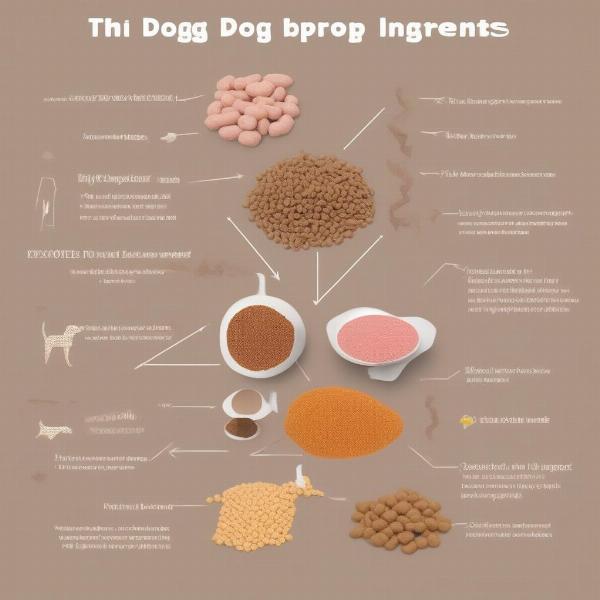Better dog food can lead to less poop. This simple equation is the key to a cleaner home and a healthier dog. Are you tired of endless poop scoops in the yard? Does your dog suffer from digestive issues? The solution might be simpler than you think: upgrading your dog’s diet. By understanding the connection between dog food quality and fecal output, you can make informed decisions that benefit both you and your furry friend.
How Does Dog Food Affect Poop?
The quality of ingredients directly impacts how much of the food your dog can actually digest. Low-quality foods often contain fillers like corn and wheat, which are difficult for dogs to break down. This results in more waste, meaning larger and more frequent poops. High-quality dog foods, on the other hand, prioritize digestible protein sources and beneficial nutrients. This means more of the food gets absorbed, leading to smaller, firmer, and less frequent stools.
 Dog Food Ingredients Affecting Poop
Dog Food Ingredients Affecting Poop
Choosing the Right Food for Better Digestion
Choosing the right food is crucial for optimal digestion. Look for foods with a high percentage of animal protein as the primary ingredient. Avoid foods with excessive fillers, artificial colors, and flavors. Consider your dog’s age, breed, and activity level when selecting a food. Puppies and active dogs require more calories and nutrients than senior dogs.
Transitioning to a New Food
Switching to a new food should be done gradually to avoid upsetting your dog’s stomach. Start by mixing a small amount of the new food with the old food. Gradually increase the proportion of new food over several days until your dog is eating only the new food. Monitor your dog’s stool during the transition and consult your veterinarian if you notice any digestive issues.
What Else Can Influence Poop Volume?
While dog food is a primary factor, other factors can influence poop volume. Hydration plays a crucial role. Ensure your dog has access to fresh water at all times. Exercise also helps regulate digestion. A dog with regular exercise is likely to have a healthier digestive system. Finally, underlying medical conditions can affect stool consistency and frequency. If you notice any significant changes in your dog’s poop, consult your veterinarian.
Is Less Poop Always Better?
While less poop is generally a good sign of efficient digestion, it’s important to monitor the consistency. Very hard, dry stools could indicate dehydration or other issues. Ideally, your dog’s poop should be firm but not too hard, easy to pick up, and relatively odorless.
FAQ
- How long does it take to see a difference in poop after changing food? It typically takes a few days to a week to see a noticeable difference in your dog’s poop after switching to a new food.
- What if my dog still has a lot of poop on a high-quality diet? Consult your veterinarian. There might be an underlying medical condition or the food might not be the right fit for your dog.
- Can too much fiber cause more poop? While fiber is important for digestion, too much can lead to increased stool volume.
- Are grain-free diets always better for less poop? Not necessarily. Some dogs thrive on grain-free diets, while others do better with grains. It depends on the individual dog.
- What are some signs of digestive issues I should watch out for? Signs include vomiting, diarrhea, constipation, loss of appetite, and changes in stool consistency or frequency.
- Should I add supplements to my dog’s food for better digestion? Consult your veterinarian before adding any supplements to your dog’s diet.
- What’s the best way to dispose of dog poop? Always pick up your dog’s poop and dispose of it responsibly, either in a designated waste bin or by composting it (if allowed in your area).
Related Articles
- happy dog of cape cod
- last minute uk dog friendly holidays
- dog friendly lodges in devon
- snowdonia cottages with dogs
About ILM Dog
ILM Dog is your trusted international resource for all things dog-related. We offer expert advice on dog breeds, health, training, nutrition, grooming, and much more. Our mission is to empower dog owners worldwide with the knowledge and resources they need to provide the best possible care for their canine companions. Whether you’re a seasoned dog owner or just starting your journey, ILM Dog is here to help. Contact us today for expert advice and support! Email: [email protected], Phone: +44 20-3965-8624.